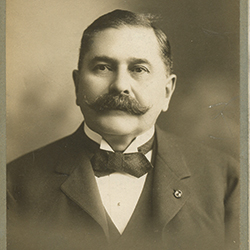
Unearthing new insights into Peoria’s Civil War history…
Greater Peoria boasts a substantial history of Civil War involvement, with many local businesses, schools and families tracing their roots back to veterans who saw action in some of its major battles. While there are many collections of English-language Civil War writings by and about Peoria’s service members—such as Charles Ballance and Robert Ingersoll—only a select few volumes of Civil War writings by native Germans were available in English.
One such volume which recently hit the market is Yankee Dutchmen Under Fire: Civil War Letters from the 82nd Illinois Infantry by Joseph R. Reinhart. A Kentucky native and graduate of Bellarmine College and Indiana University, Reinhart has previously translated and edited four volumes of Civil War writings by German immigrants. He became particularly interested in researching Civil War infantrymen when he discovered in 1993 that his great-great grandfather had served in the 28th Kentucky Volunteer Infantry.
Yankee Dutchmen Under Fire is a collection of 61 letters written by German immigrants serving in the 82nd Illinois Regiment. It covers nearly three years of the war through firsthand accounts of major campaigns like the Battle of Gettysburg and Sherman’s March to the Sea, as well as the details of everyday military life. In addition, correspondence with wartime publishers reveals the views of these German natives toward the war, their American compatriots, and prominent figures ranging from their own officers to President Abraham Lincoln. Today, these letters, originally published in German-American newspapers, provide valuable information about ethnic identities, prejudices and politics during the Civil War.
The 82nd Illinois was one of about 30 regiments comprised of predominantly German immigrants—and one of just two with a Jewish company. Yankee Dutchmen under Fire includes Reinhart’s translations of more than 20 letters written by Peoria’s Captain Rudolph Mueller, a German native who recruited 40 men to the 82nd. Numerous other writings in the collection mention Captain Joseph Benedict Greenhut—soon to become one of Peoria’s famous whiskey barons—who happened to be one of the few Jewish men serving in the Regiment (Company K).
Born in 1843 at a military post in Austria, Greenhut came with his mother to the United States at age nine. He enlisted immediately following President Lincoln’s call to arms. After being quickly promoted to sergeant, Greenhut was granted six months leave for a wound sustained at Fort Donelson; upon his return, he was promoted to captain of the 82nd, where he remained in active service until 1864. Twenty years later, Greenhut became one of Peoria’s best-known citizens, founding the famous Distillers’ and Cattle Feeders’ Trust in 1887 and serving as president until 1895.
“Greenhut was one of three Illinois commissioners appointed by Governor Fifer to erect a monument on the Gettysburg Battlefield in honor of the Illinois soldiers who fought there,” notes Reinhart. He even delivered the dedication speech for the monument at Gettysburg on September 3rd, 1891. Greenhut was an obvious choice for the honor; the German soldiers quoted in Reinhart’s collection spoke very highly of him, reporting that he “acted very bravely” and was “one of the last to return from the battlefield with our flag in his hand.” Another soldier agreed that Greenhut was “the subject of praise and admiration” and “showed himself as the bravest of the brave, calm, prudent, valiant.” iBi
For more information or to order the book, visit kentstateuniversitypress.com or amazon.com.

